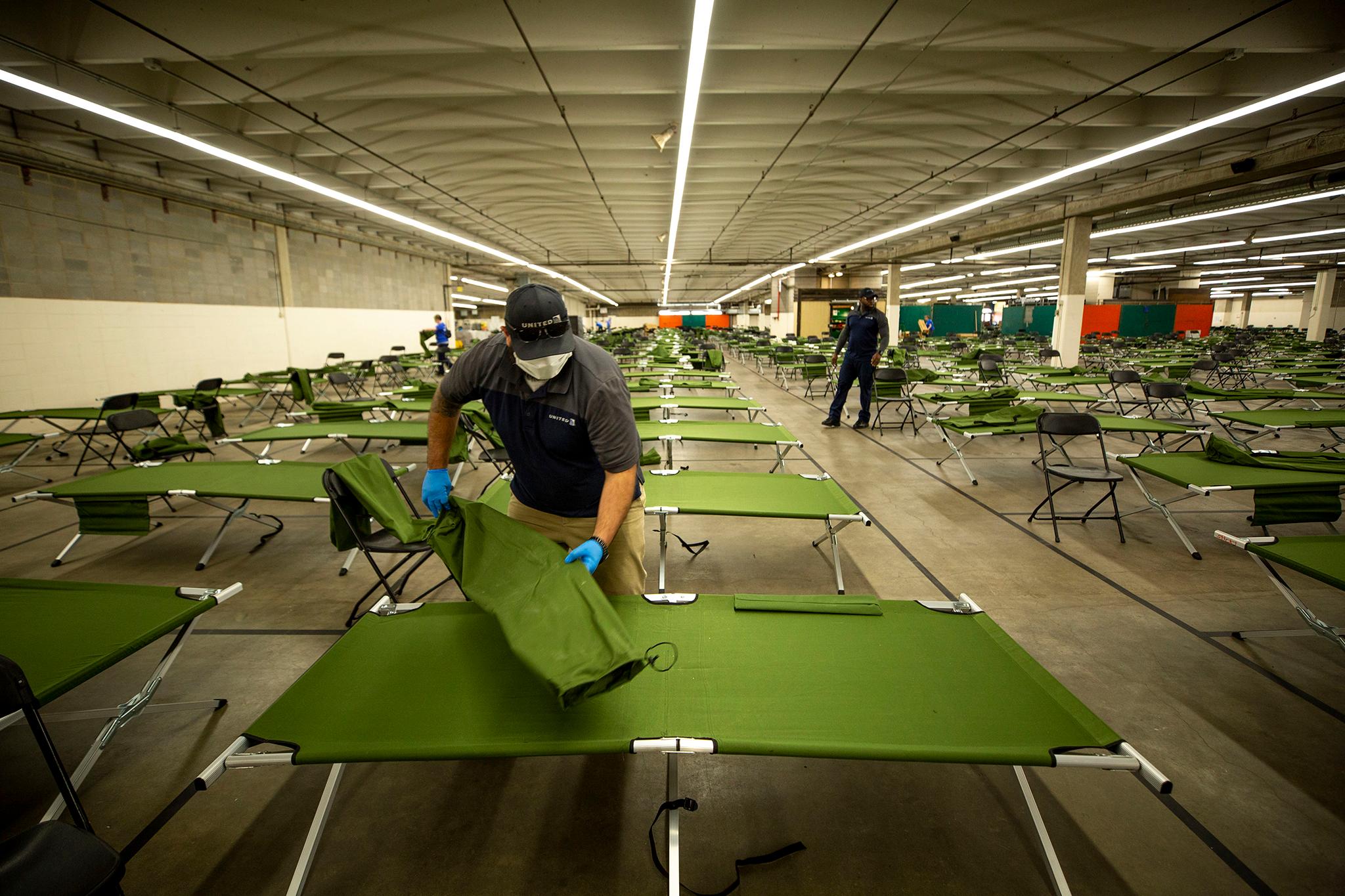Updates with confirmed cases increasing to 13.
COVID-19 has broken out among staff at the large shelter for men experiencing homelessness at Denver's National Western Complex.
As of May 5, 13 people working for the Denver Rescue Mission, which operates the men's shelter, have tested positive for the disease caused by the new coronavirus, city spokeswoman Heather Burke said in a May 6 e-mail. She said of those 13, three have recovered enough to be able to return to work.
When the first seven confirmed cases were announced April 30, city spokesman Alton Dillard said those who test positive would not be able to resume work until they had met criteria that includes going at least 72 hours without fever, showing no continuing symptoms of cough and shortness of breath, and having had at least seven days pass since their symptoms began.
Dillard said transmission among people experiencing homelessness was "widespread" and that factors such as the difficulty of maintaining social distancing contributed to outbreak.
"However, effective strategies such as testing, referral to activated respite rooms for symptomatic individuals, referral to protective action rooms for those in high-risk populations, and environmental controls implemented amongst the service provider are minimizing the spread of illness," Dillard said.
The National Western shelter opened in April to provide a safe place for people experiencing homelessness during the COVID-19 outbreak.
Brad Meuli, the Denver Rescue Mission's president and CEO, said shelter workers are on the front lines of the effort to contain COVID-19.
"This is the nature of the work that we're doing right now," Meuli said. "We're very much at risk."
"We thought it would be better when we went out to National Western because of social distancing," Meuli said. "But it's hard."
Other health concerns and immune systems weakened by the stress of living on the streets put people experiencing homelessness at greater risk of suffering the worst effects of COVID-19, which can be fatal. People arriving at shelters, including the faciliy at the National Western for men and one nearby at the Coliseum led by Catholic Charities of Denver, are screened before entering. Those with symptoms of respiratory illness are diverted to be tested and to stay at hotel rooms rented by the city.
Because of a lack of capacity in Denver, only people exhibiting symptoms have been tested. That has been the case in other cities. But after outbreaks of COVID-19 at five shelters in three cities (Boston, San Francisco and Seattle), public health researchers set out to test everyone, regardless of whether they had symptoms, at shelters in those cities.
The researchers found what they called "high proportions" of positive tests -- 17 percent of both residents and staff in Seattle; 36 percent of residents and 30 percent of staff in Boston; 66 percent of residents and 16 percent of staff in San Francisco. As a control, widespread testing was also conducted in shelters in Atlanta, where no COVID-19 cases had been reported and where the results were just 4 percent of residents and 2 percent of staff members testing positive.
Based on those results, the CDC has said that "testing of all residents and staff members regardless of symptoms at shelters where clusters have been detected should be considered."
Meuli called for testing everyone experiencing homelessness.
"I think generally the homeless population is at great risk," he said.
The Colorado Coalition for the Homeless has been conducting many of the tests for people experiencing homelessness in Denver, including at the National Western and Coliseum facilities.
"Before we move people into these congregant settings, we should be testing (everyone). And we can't right now," in part because of a lack of tests, said Cathy Alderman, vice president of communications and public policy for the Colorado Coalition for the Homeless.
She said widespread testing would allow shelters to move people who are carrying the virus but not showing symptoms elsewhere, making shelters safer for both staff and residents. Britta Fisher, who heads the city's housing department, said that as of April 30 690 hotel rooms had been secured for people experiencing homelessness who are affected by the coronavirus outbreak and need a place to stay that is not a shelter. Officials are trying to secure more rooms.
"We don't have enough places to put what will probably be a lot of positive tests," Alderman said.
Alderman estimated 3,000 tests would be required to test everyone experiencing homelessness in Denver. She also said more staff would be needed, adding that her organization is already spread thin.
Alderman's organization was among nearly 50 groups from across the state who wrote Gov. Jared Polis in April requesting more support for people experiencing homelessness. They called, among other things, for more testing resources and for prioritizing for tests both people using and staffing shelters "to prevent the spread of COVID-19 among our population of people experiencing homelessness."
In his response, Polis said the state was facing a "massive shortage" of both tests and personal protective equipment, such as masks and gloves, known as PPE.
"We are working now to build our supply chains for tests and PPE, at which point we will begin to prioritize shelters in the priority matrix for distribution," Polis wrote.
He also said Denver received federal COVID relief funding "which can also be leveraged for these efforts."
Dillard, the city spokesman, said a COVID Task Force that includes representatives of homelessness service organizations and city agencies was working on estimating the percentage of people experiencing homelessness who are carrying the coronavirus, whether they are exhibiting symptoms, and will use that information to" inform a request to the state for universal testing."












